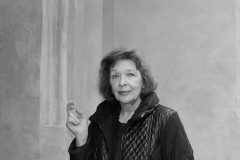Zsuzsanna Gahse [Switzerland]
Zsuzsanna Gahse was born in 1946 in Budapest. After the Hungarian Uprising in 1956, her family fled to Vienna, where Gahse attended high school, and later to Kassel, Germany, where she continued her studies and learned German.
Since 1969 she has published literary texts in anthologies and literary journals such as »Akzente«, »Neue Deutsche Literatur« and »Neue Sirene«. Her first volume of stories, »Zero«, appeared in 1983. The newspaper »Die Zeit« wrote that the stories precise observations exemplified the immediate power of the written word: »An objective, verbal interest emerges between author and reader, one that is about nothing other than the language in which the story is told. That is the best prerequisite for literature.« In the same year Gahse received the aspekte-Literaturpreis for the best German-language prose début. Gahse describes her own work as an approximation of reality through omission of the superfluous, with the goal of a »language that stands somewhere between narrative prose and poetry« coupled with a »narrative style in which individual sentences are significant or even exceptional«, yet also yield a story. After numerous additional publications in the 1980s and 1990s, this definition found expression in the title of her book, »Instabile Texte« (2005; Eng. »Volatile Texts: Us Two«, 2016). The »Frankfurter Allgemeine Zeitung« remarked that the author has created her own literary genre, with an understanding of literality in which every utterance is already a translation. It is thus all the more appropriate that Gahse has also been translating texts from Hungarian into German since 1978, including works by Péter Esterházy, Péter Nádas and István Vörös. In 2009 she published »Erzählinseln« (tr: Story Islands), a collection of lectures she gave as the seventh holder of the Chamisso Poetry Chair in Dresden. These texts reflect upon the prerequisites and conditions of her writing between languages, which creates a sense of perpetual re-narration. After processing her own refugee experiences in her book »Nichts ist wie oder Rosa kehrt nicht zurück« (1999; tr: Nothing is like or Rosa does not return) – as a search for freedom and independence, but also as an endless failure of all the protagonist’s attempts to find her own place in the world – she let her first-person narrator in »Südsudelbuch« (2012; tr: South Waste Book) deliver the core statement: »Alle sind unterwegs« (tr: Everyone is in transit). Since 1998 Gahse has lived in Müllheim, Switzerland, the setting for her recent book, »Jan, Janka, Sara und ich« (2015; tr: Jan, Janka, Sara and I). Twenty-three people adjourn to a sound studio in Büren, a town on Wellenberg mountain, to record observations that allow readers to not only »bio-topographically« (»Neue Zürcher Zeitung«) experience something about the location and its surroundings, but also to learn something about its inhabitants.
Gahse’s literary works have earned her many honors, including the 2006 Adelbert-von-Chamisso-Preis. In 2011 she was awarded membership in the German Academy for Language and Literature.
Bibliography
Zero
1983
Nichts ist wie oder Rosa kehrt nicht zurück
1999
Reden für Dresden
2009
Südsudelbuch
2012
Jan, Janka, Sara und ich
2015

